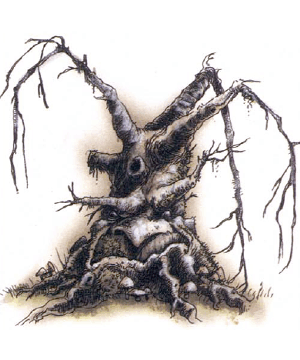

Dragon Mountain • Monstrous Compendium Annual, Volume One

| Climate/Terrain: | Subterranean |
|---|---|
| Frequency: | Very rare |
| Organization: | Solitary |
| Activity Cycle: | Any |
| Diet: | Carnivore |
| Intelligence: | Very (11-12) |
| Treasure: | Nil |
| Alignment: | Neutral |
| No. Appearing: | 1 |
| Armor Class: | 2 |
| Movement: | 3 |
| Hit Dice: | 9+5 |
| THAC0: | 11 |
| No. of Attacks: | 2 |
| Damage/Attack: | 1d8 (×2) |
| Special Attacks: | Projectiles |
| Special Defenses: | Nil |
| Magic Resistance: | 30% |
| Size: | L (11’ tall) |
| Morale: | Champion (15-16) |
| XP Value: | 2,000 |
The noran, although a rather ridiculous-looking creature, is one of the more fearsome monsters one can find underground. It looks like a sickly, petrified treant, with knots and holes covering its entire surface and a face hidden in the trunk. It has two long, whiplike prehensile branches with which it can pick up small items. Finally, it has a cavity on its top that extends down into its main body, which narrows until it ends in a knothole.
Normal dungeon creatures leave the noran’s area alone, moving away if one comes into the area. By keeping careful watch on it and keeping themselves hidden, the creatures can slowly return after it passes on to greener pastures.
Noran speak a rudimentary form of Common and can also communicate haltingly with other forms of tree, including treants.
Combat: Obviously, the noran’s prehensile arms pose a threat, for they can strike at a range of up to 10 feet with frightening speed. However, the noran’s arms should be the least of any opponent’s worries, for the creature carries a far more devastating weapon concealed in its body.
The knothole just below the noran’s mouth can open and close and fire fist-sized rocks at frighteningly high speeds. It feeds these rocks to itself by picking them up with its prehensile arms and dropping them into the cavity on top. Rocks fired this way inflict 2d8 points of damage. It can fire one rock per round, provided it foregoes other attacks. The range for an accurate spit rock is 60 feet. However, it can store up to 10 rocks in its cavity before combat. If it has done so, it can both fight with its arms and spit rocks at its opponents. If it so desires, it can fight two opponents within reach and fire a rock at a third.
Because it is made of a petrified material, the noran suffers normal damage from fire-based attacks, but it doesn’t continue to burn like other, ordinary wooden monsters would. However, it suffers double normal damage from bludgeoning weapons.
Habitat/Society: The noran is a solitary, nomadic creature. Since most prey flees the area when a noran arrives, it must constantly be on the search fur more food. It therefore stays in an area only as long as other creatures stay, and moves on when they do.
Despite the fact that they are solitary, norans will not fight others of their kind they meet. Instead, they usually take the opportunity to reproduce. How they do this is unknown, but both norans leave the encounter bearing an acorn. For one year after this takes place, the noran cannot fire rocks, but after that time the noran ejects an infant, which must then fend for itself. It has all the statistics of an adult noran from the point it is born.
Ecology: It is surmised that norans are distant relatives of the treant, although how they came to occupy the underground is an explanation best left to a trained sage.
As noted, the noran is carnivorous. It eats any fleshy creature it can kill. It prefers its food bruised and bloody, making it more tender and thus more easily digestible when the noran shuffles over it. The proteins of living flesh are the only ones concentrated enough to nourish a noran. The ordinary diet (for a plant) of sunlight, soil nutrients, and water is simply lacking in the ingredients necessary for a noran to survive.
Any treasure or undigestibles left on a victim’s body when consumed by the noran are spit out and left to lie on the dungeon floor. Those retracing a noran’s steps can often find useful items along the way, though they might have to fight other dungeon scavengers for said treasures. Some creatures actually prosper by following in a noran’s footsteps. However, they all too often find that this course leads to doom if the noran decides to retrace its own steps.
